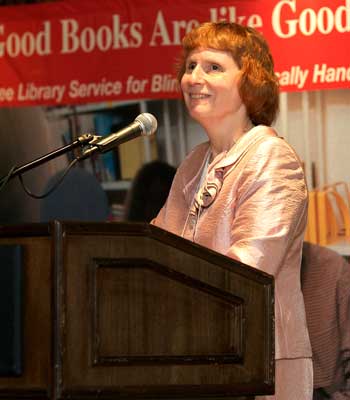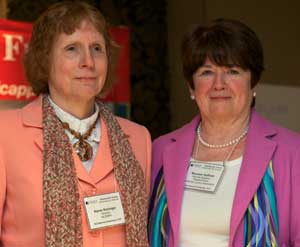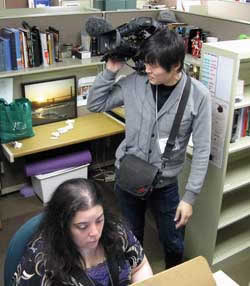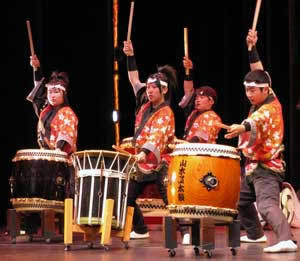An interview with Karen Keninger

On March 26, 2012, Karen A. Keninger took the helm of the National Library Service for the Blind and Physically Handicapped (NLS), becoming the first blind person to be named director in the agency’s 80-year history.
Keninger was the director of the Iowa Department for the Blind, a leading U.S. provider of vocational rehabilitation and independent-living programs and library services for blind and visually impaired individuals, from 2008 until her appointment to NLS. Prior to that, she served as director of the Iowa Library for the Blind and Physically Handicapped for eight years, managing the statewide library program, the machine-lending agency, instructional materials center, and braille- and audio-production units. A native Iowan, Keninger holds a bachelor’s degree in journalism from Drake University in Iowa and a master’s in English with a specialty in business and technical writing from Iowa State University. She completed graduate courses in library and information science at the University of Iowa.
Keninger took some time out from her schedule to answer a few questions.
News:What caused your blindness and at what age?
KK: Retinitis pigmentosa is the diagnosis. I was 16 months old when my parents discovered it. I had some usable vision as a child but lost it all by the time I was 20.
News: What types of prejudices have you encountered? Have these changed, or do you still notice the same behaviors today?
KK: People assume that because I am blind, I can’t do things. It is still tough for a blind person to get a job, or to be allowed to assume leadership roles in community and sometimes family settings. Much progress has been made during the past 50-plus years in breaking down barriers to employment and inclusion, but the process is far from complete.
News: At what age did you learn to read braille?
KK: Seven. I started reading large print but switched in second grade.
News: Do you remember your first book?
KK: I don’t remember my first book. What I do remember is how exciting it was every time the mailman brought me those braille books wrapped up in brown paper and tied with string. It was like Christmas. Later I started getting talking books as well.
News: Long before you were named director, you had been involved in NLS—not only as a patron, but as part of your career. How did you come to be the director of the Iowa Library for the Blind and Physically Handicapped? Describe your experiences there.
KK: I started my career at the Iowa Department for the Blind, the parent organization of the library, in 1995. In 2000 I was appointed first interim and then permanent director of the library.
During my eight years as regional librarian, I implemented several phone-based book clubs that are still active. I initiated our digital recording program, installing a state-of-the-art recording studio, hiring a recording expert, and converting our home-based recording program to a digital system. I also upgraded our volunteer braille lists to current software and implemented a proofreading program for our locally produced braille. I initiated the move to the digital talking book in our library, which I then handed over to my successor to complete.
News: Becoming NLS director meant making some big changes in your life; moving more than a thousand miles away from your family is just one of them. What prompted you to apply for and take the job?
KK: I was very happy in my job as director of the Iowa Department for the Blind. But I have always loved and valued this service and this is the only job I would have left that one for. NLS is on the cusp of many changes, and I am pleased to be in a position as a lifelong patron as well as an administrator to influence and guide those changes. The opportunity to play a role in reinvigorating braille as the one truly effective medium for literacy for blind people is especially important to me.
News: As director of the Iowa Library, you had a great deal of direct contact with the program’s readers. What lessons learned from that experience do you hope to bring to NLS headquarters?
KK: People with disabilities—especially people who are blind—are still struggling to be allowed to participate fully in the American dream. NLS patrons read, on average, far more books and magazines than most Americans. Library service is for many the means for gathering in-depth information, exploring ideas, and being entertained. We serve all ages, socioeconomic levels, and interests, because blind and disabled people are a cross-section of our society. Therefore, this cannot be a one-size-fits-all program.
News: What was your initial assessment of NLS, once you settled in and rolled up your sleeves?
KK: I had a lot to learn about NLS, about the Library of Congress, about Washington, D.C., about my staff, our projects, our history, and our goals. But I also recognized very quickly the creativity, talent, and dedication of NLS staff, and I knew we could work together to advance our programs.
News: Describe your first month of work here.
KK: My first month of work was a massive infusion of information from all sides. I asked people to come to me one at a time and in groups to tell me everything they could about their sections, their staff, their projects, their problems and concerns. I took copious notes, reviewed them, asked more questions, and then began to grasp the issues and to focus my efforts.
News: What are your priorities for the organization?
KK:
- Maintain the highest quality standards for all NLS products.
- Enhance the reading experience for all NLS patrons by leveraging current and future technologies to improve the reading and delivery systems.
- Expand the scope and quantity of titles available in alternative formats through the NLS system.
- Take a leading role in positioning braille as a viable, practical, and achievable literacy medium for all blind Americans.
- Increase readership.
News: What do you believe is our biggest challenge?
KK: We have very tech-savvy patrons and those who are not. We serve all ages, all walks of life. We have braille readers as well as audio readers. One of our biggest challenges will be to serve all patrons equally.
Expanding services and enhancing products are top priorities says Keninger
New NLS director Karen Keninger received a standing ovation when she shared her vision for the future of special-format library service with the nearly 200 representatives of the NLS network of cooperating libraries gathered for the biennial National Conference of Librarians Serving Blind and Physically Handicapped Readers. The conference was held May 20–24, 2012, in Newport, Rhode Island, under the theme “Charting Our Course: Expanding Our Services.”

Our primary goal is to ensure that our patrons have the reading materials that they need to increase their quality of life."
-Karen Keninger, NLS director
In her remarks, Keninger recognized the work of former NLS director Frank Kurt Cylke, who retired at the end of February 2011. “Kurt did a tremendous job. He guided the program from rigid disks to cassettes and on to digital,” she said. “He safeguarded the integrity of the program. I plan to maintain the same high standards.
“Our primary goal is to ensure that our patrons have the reading materials that they need to increase their quality of life. This is what we are all about,” said Keninger, who took the helm of the national organization on March 26.
The director also held a forum to discuss the future of braille that was attended by more than 50 of the conference participants. “Braille is the basic literacy tool for blind people,” Keninger said. “We have to use all our resources to bring people who cannot read standard print the materials they need.”
The librarians were welcomed to Rhode Island by Howard Boksenbaum, chief library officer of the Providence Office of Library and Information Services, and Andrew Egan, regional librarian. Egan shared some of the town’s history and information about attractions. Boksenbaum told the librarians, “Your service occupies a critical niche in Rhode Island. We are delighted that you chose Newport as the place to hash out your future.”
Conference speakers
Guest presenters. “Libraries must be at the table,” Maureen Sullivan, president-elect of the American Library Association, advised in her remarks. “Make sure that your leaders have the information they need to make decisions about library service.” In this current environment, libraries must recognize the opportunity to highlight their value to the community. “Libraries are the major organization supporting literacy across the ages,” explained Sullivan. “Literacy begins at birth” and carries people through the rest of their lives. She encouraged librarians to develop strategic plans and create outreach partnerships. “We must tell our stories in relevant ways,” she said.

Christine Koontz, a research associate at the Florida State University School of Library and Information Studies, discussed the stages in developing a marketing plan. She said, “It is critical to a successful marketing plan that you follow all the steps before you get to the fun part of creating materials.” An organization’s mission, goals, and objectives should be stated in its strategic plan, Koontz explained. She then laid out a four-step marketing model: research, segmentation, mix, and evaluation. According to Koontz, the information gained and used at each stage will enhance a library’s ability to serve its community.


Patron presenters. Oceanographer Amy Bower, who describes herself as a longtime patron of NLS, said she lost her sight in her twenties to retinitis pigmentosa and macular issues early in her career. Because of her vision loss, she said, an ophthalmologist tried to discourage her from her chosen career path. Now a PhD, she described her work charting ocean currents, which “move heat around,” at OceanInsight for the Blind, a collaborative project between Perkins School for the Blind and Woods Hole Oceanographic Institution. Bower said OceanInsight’s programs help to “get students interested in science and scientific research, demonstrate opportunities in the field, encourage students to identify interests and maximize their potential, and provide role models and mentors.”
Sled-dog racer Rachel Scdoris, who is very nearsighted in one eye, very farsighted in the other, and color blind, said she had a hard time accepting her blindness. “At school, I was called the fake blind student by the other blind students because I had some vision.” For a long time, she explained, she would not read the talking books her teachers provided. She gradually took to them when she discovered they helped her complete school assignments. Scdoris, who began sled-dog racing in her youth, is recognized as the first blind racer to compete in the Iditarod. She described her adventures on the trail, including getting lost, suffering frostbite, and crashing, which are all normal experiences for sled-dog racers—or “mushers,” as they are sometimes called.
NLS updateDigital audio materials. Network library staffers were advised that digital-book recalls will begin soon. Magazines will be moving from cassettes to digital cartridges by the end of this year. The cartridges will be customized, with each patron’s subscriptions on one cartridge, and will announce the contents at the start. The cartridges, which will be blue and issued in maroon containers with the Library of Congress book-flag logo, will be labeled “Magazines” along with the issue date.
Braille and Audio Reading Download (BARD). BARD is being updated to include braille books and magazines, braille music scores and audio music instructional materials, foreign-language books, and locally produced books and magazines. Patrons registered for Web-Braille will be able to continue accessing books through links in the online catalog and the HTML version of Braille Book Review, but will need a BARD ID and password. BARD will also provide a customizable wish list that allows users to store and access titles that they want to download later, as well as a download history feature that displays a list of all of the titles a user has already downloaded.
Youth services. Jill Garcia, senior selection librarian (Young Adult and Children’s Collection), announced the use of GoogleDocs as a platform for sharing between network libraries and NLS. A spreadsheet, available at http://bit.ly/Jzp4Jc, allows each network library to request up to five books to be converted from analog to digital. Libraries that need specific titles for summer reading programs will be able to request those books using another spreadsheet (available at http://bit.ly/KiJBLx). Requests to record books that are local and/or state youth-book award winners or nominees may be posted on a third spreadsheet at http://bit.ly/KpgRCH.

Public education. NLS has begun producing and distributing a series of print and broadcast public service announcements (PSAs) through two syndicate services. The goal is to attract new readers to the NLS program, so each PSA will address a different topic highlighted by current events. The first PSA focused on the economy and the second on veterans.
The Publication Education Advisory Group, reactivated in October 2011, was introduced. Members are Keri Wilkins of the Northern Regional Conference, Susan Whittle of the Southern Conference, Toni Harrell of the Midlands Conference, and Mary Jane Kayes of the Western Conference. The group will discuss and develop recommendations for public-education materials and review and comment on NLS public education plans and products during their development.
As the conference closed, Keninger announced that the next biennial conference, scheduled for 2014, will be held in Oklahoma City.
NLS specialist brings quake survivors to United States
Thirteen young members of a Japanese drum group who lived through the 2011 Fukushima earthquake, tidal wave, and nuclear accident spent 10 days in the United States in April—a visit coordinated by NLS production specialist Michelle Spezzacatena, who once taught English in Japan.
Before she came to work at the NLS in 2006, Spezzacatena taught English for three years in the town of Kawamata, about 20 miles northwest of the Fukushima Daiichi nuclear power plant.


Kawamata also is home to the Yamakiya Taiko Club, a drum ensemble made up of students ages 12 to 23. “Taiko”—a Japanese word that refers to the various types of drums themselves as well as the music and the style of playing—has been part of Japanese culture for 2,000 years, but group drumming has been popular only since the 1950s. The Yamakiya Taiko Club has won numerous awards.
After the March 11, 2011, earthquake and tsunami that killed more than 15,850 people and damaged the nearby power plant, the Yamakiya District of Kawamata was evacuated because of the radiation danger. Despite being scattered, the taiko club members continued to gather to rehearse and perform.
Spezzacatena worked with Darryl Wharton-Rigby of Baltimore, who had also taught English to taiko club members, to bring the club to Washington for the Cherry Blossom Festival’s centennial celebration. Thanks to support from American Airlines—which agreed to ship the drums at cost—and the U.S.-Japan Council’s new Tomodachi cultural-exchange initiative, the idea became a reality.

During its visit, the taiko club performed in the Cherry Blossom Parade, at the Sakura Matsuri street festival in Washington, and at Morgan State University in Baltimore. The drummers met Japan’s ambassador to the United States, Ichiro Fujisaki; planted three cherry trees at Baker Park in Frederick, Maryland; and took a tour of the Library’s Jefferson Building. On their last night in America, they performed on the Kennedy Center’s Millennium Stage.
Washington state library honored by Seattle mayor

On June 5 Seattle mayor Mike McGinn presented Danielle Miller, program manager of the Washington Talking Book and Braille Library (WTBBL), with the Mayor’s Award for the library’s work empowering individuals with disabilities. The presentation was made during a special ceremony in Seattle City Hall that was organized by the Seattle Human Services Coalition.

The mayor also proclaimed June 5, 2012, as Washington Talking Book and Braille Library Day. Mayor McGinn presented Miller and WTBBL patron Quincy Daniels with the proclamation in print and braille.
NLS consultant Pamela Davenport was also in attendance.
Carbo named audiobook production specialist
In March NLS announced Phillip Carbo as its new audiobook production specialist. Carbo will fill the position vacated by Bill West, who retired in August 2011 after 48 years of service.
Carbo began working at NLS in 2006 as a monitor in the recording studio. In this role, he recorded and reviewed narration and assisted with post-production work and audio equipment maintenance. He also served as the lead producer of the studio’s audiobooks. “My previous experience with audiobook production and audio engineering made me uniquely suited to handle these tasks,” said Carbo.

As a teenager Carbo became interested in music, playing bass guitar and working as a recording engineer. “I recorded for the bands of my friends, did small internships at recording studios in Washington, D.C., and trained with several live sound engineers.” Having spent several years as a freelancer, he enrolled in the Conservatory of Recording Arts and Sciences in Tempe, Arizona, and earned a certificate of completion in 2004.
Following graduation Carbo moved to New York, where he worked as an engineer recording for bands and solo artists such as Will Smith and Boy George. He also served as an assistant engineer on Carly Simon’s Grammy-nominated album Moonlight Serenade.
After a year in New York, Carbo returned to Washington, D.C., where he worked for Potomac Talking Books for several months before joining the staff at NLS.
“The audiobook production specialist is a vital position at NLS and very important for the network,” said Celeste Lawson, director of the NLS studio. “With all of his experience and knowledge of the program and the studio, Phillip is the best person for the job.”
“The patrons of the talking-book program are our focus. So the ability to make cost-effective, high-quality recordings is important,” said Carbo. “As an audiobook production specialist, I can help network studios create digital talking books of professional quality, leading to a wider distribution of the books throughout the network.”
Carbo has already begun researching alternative methods network studios can use to broaden their audiobook production options. He is also considering potential areas for technological advancement.
With all that Carbo has achieved while working with recording artists, he is most excited about what he is doing at NLS. “I feel much more proud of what I am doing now. To me, helping the blind community is a much more fulfilling job than anything I have done in the music industry. Working for NLS is far more rewarding.”